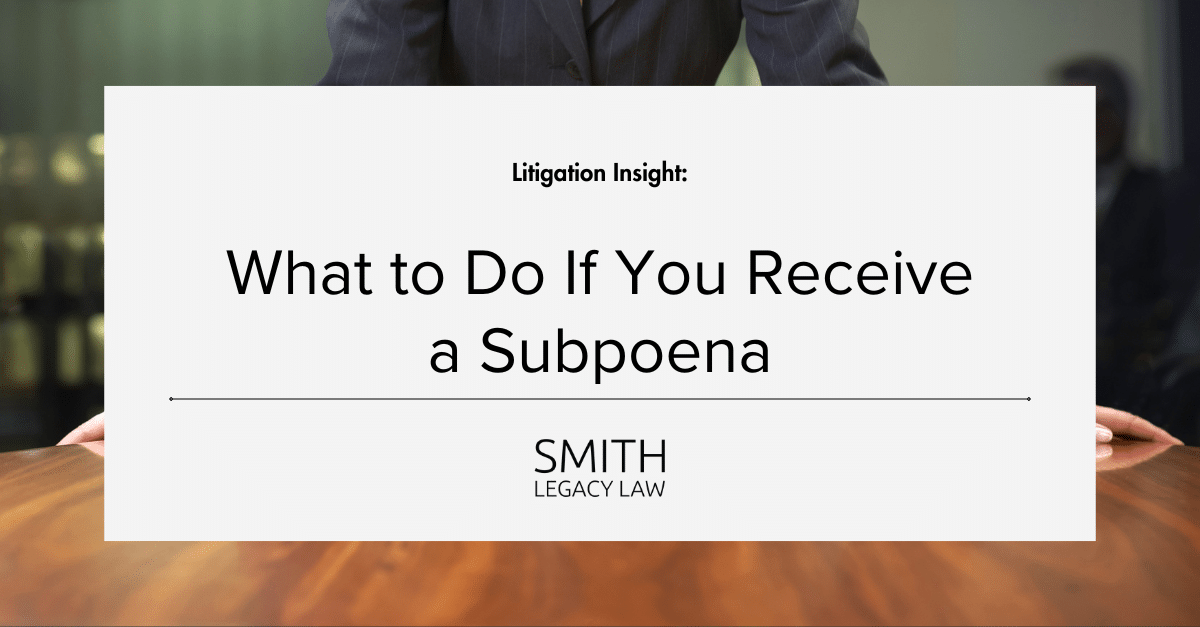Getting a subpoena is a serious matter that should never be ignored. A subpoena is a written order from an attorney, court, or governmental entity compelling an individual to give testimony and/or provide requested documents. Failure to comply with a subpoena may be punishable as criminal or civil contempt, which can result in fines and even prison. If you receive a subpoena, what should you do to protect yourself and your business?
Have an Attorney Review the Subpoena
As soon as you receive a subpoena, you should contact an attorney. In general, a lawyer will consider the following:
- What is the subpoena looking to obtain? There are two broad categories of subpoenas. A subpoena duces tecum is an order to provide physical evidence. This may include documents, data, or other records. A subpoena ad testificandum is an order requiring someone to give testimony about a particular topic in a legal setting. Notably, a subpoena can ask for both testimony and documents.
- Are there objections to the subpoena? A motion can be filed to quash the subpoena if there are appropriate grounds.
- How can records be produced? The subpoena will likely indicate how to comply with the request, however, there may be obstacles to identifying and producing the requested information. Additionally, steps should be taken to ensure that any relevant documents or other records are preserved.
- What is the timing and form of the response required? The subpoena will have deadlines and indicate how information should be provided, such as in paper or electronically.
Determine Whether and How the Information Can Be Legally Provided
The subpoena may request information that is privileged (such as documents that are protected under attorney-client or work product privilege), confidential, or subject to privacy laws. In that case, it may be necessary for your attorney to take steps to withhold or limit access to the information. For example, privileged documents may be withheld from the opposing party, or information on them may be redacted (blacked out). A protective order can also be used to maintain the confidentiality of any documents produced to ensure they are not made public.
Importantly, if the information requested is the subject of a confidentiality agreement with a third party, your contract with that party likely provides that you may produce the information pursuant to a court order. However, you may be required first to give the third-party notice and an opportunity to object to the subpoena.
Establish a Records Search Protocol
Typically, your attorney will speak to you to understand where records may be kept, in what form they are kept, and how best to obtain them. The methods used to search for records must be documented to establish that you made a good-faith effort to find all responsive documents.
Review All Documents Before Producing Them
An initial search for records may result in retrieving more documents than are needed. These must be culled to identify only what is required to be submitted. Before production, all documents must be reviewed thoroughly for responsiveness, privilege, and confidentiality.
Prepare Individuals to Testify
If testimony is required, you and your attorney will work together to ensure that you are prepared to testify. If the subpoena is addressed to a business or organization, you and your attorney must determine who is the proper person to serve as a company representative and make sure they are properly prepared to testify.
Try to Resolve Disputes Over the Subpoena Through Negotiation
Your attorney will assess whether there are grounds to object to the subpoena. For example, your lawyer may ask for more time to respond or to limit the scope of production. The best practice is to reach out to the requesting party’s attorney to discuss these issues and attempt to settle them without going to the judge. Filing a motion with the court will delay the matter and increase legal costs and should be avoided when possible.
Go to Court If Necessary
If disputes over the subpoena cannot be resolved informally, it may be necessary to file a motion to have a judge intervene and decide the matter before you produce any documents.
If you receive a subpoena, it should never be ignored or treated as a routine matter. Our attorneys have extensive litigation experience, including responding to subpoenas, managing document requests, and advocating for clients before a judge. If you or your company receives a subpoena, contact us to learn how we can help you with your matter.
